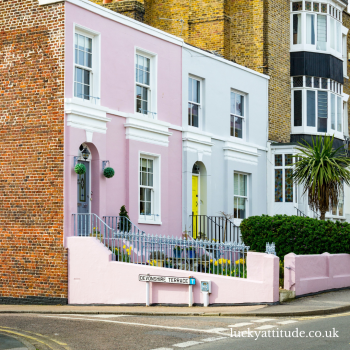Step-By-Step Process Of Buying Your First Property In The UK

The UK is going through an economic crisis.
Mortgage interest rates and costs of goods are going up, while salaries stay the same and people are made redundant.
If you are ready to buy your 1st home right now, here are a few things to consider:
1. Time your purchase right: the best time to buy property is winter
Why winter? Because people are desperate to sell by the end of the year and you may be able to get a better deal.
Additionally, if the place has seasonal mold or other cold-related faults, winter is when you can see it better.
2. Pick the area carefully
You should have a general idea of what size and type of property you want before you even start viewing.
Figure out a minimum and maximum square footage and the number of bedrooms you’ll need.
If you want to buy in an area you don’t know very well, go and prowl the neighborhood on foot, visit the parks and shops at different times of the day. Speak to local people, Google about crime rates, etc.
Many people in bigger cities like London and Manchester choose to move to nearby commuter towns to afford bigger/better places. If you’re ready to buy a new home in less popular areas, you’re likely to come against less competition and more room for negotiation.
3. Get a Mortgage in Principle from a mortgage broker
A mortgage is a loan that enables you to cover the cost of a home.
Before making a bid on any properties, you must get your mortgage pre-approved. This will determine how much money you can borrow in order to buy a home and, in consequence, the kind of home you can afford.
Mortgage in Principle is a statement from a lender saying that they’ll lend a certain amount to you before you’ve finalised the purchase of your home. Mortgage brokers can grant you with “Mortgage in Principle” which many real estate agents and conveyancers need before moving forward with the home-buying process.
4. Avoid overstretching yourself financially
Another common mistake among homeowners is acquiring homes they can’t afford, leading them into financial trouble.
Once you speak with a mortgage broker, they will let you know how much a lender might be prepared to lend you. Sometimes, what banks can lend you surpasses your expectations. Don’t let this tempt you. Set a budget and stick to it rigidly.
There are many ongoing costs related to owning a property in the UK (our example) including service charges, council tax, repairs, and mandatory major works costs (the latter one is for leasehold properties only).
Meanwhile, compare your income and your expenses. Consider your recurring costs and other bills. Can you still live without financial stress after removing the mortgage for the month? If not, go for a lesser mortgage.
Before buying a home, do your research and see what your neighbor is trying to sell their home for. This will allow you to reduce the asking price in a reasonable way.
5. Start viewing properties
When you view properties, pay attention to public transport links, neighborhood safety, and other factors that all contribute to the value of your home.
Your neighborhood is vital while choosing a new home.
For instance, if you are moving in with your family or plan on raising a family in the new home, check if there are families in the environment. Check if it’s close to your work, schools, grocery stores, or gas stations.
If you’re the type that dislikes noises, ensure public places are not close by. If you like sports, check if any stadium is around the area. Again, ensure amenities that’ll make life easy and joyful for you and your household are close.
6. Make an offer to the seller via their estate agent
You can offer less than the asking price. We did and got it. Think of an asking price as an estimate, because if your solicitor or surveyors finds out that there is some costly damage to the property, you can ask to reduce the offer to cover those costs.
Go and speak to neighbors, they may offer tip-offs on the area or home. Unlike agents and sellers, neighbors will likely be honest about what the area is like.
7. Seller accepts the offer
This may take some time in the UK. You may enter a bidding war with other buyers. Some people will try to overbid you and pay above the asking price. This back-and-forth will take some time.
Some sellers will go with the highest bidder, others are more sentimental and sell the house to the new owners they personally like more.
As soon as the seller accepts your offer, ask them to ‘take it off the market’. This cuts the chance of gazumping, where the seller accepts another higher offer after the sale has been agreed. Until contracts are exchanged, either party can pull out at any time.
8. Buyer gets a mortgage offer
Once your offer is accepted, go back to your mortgage broker and apply for an official mortgage offer.
A mortgage broker will ask you to submit your payslip and bank statement to understand your income and spending habits.
If all looks good, you will be granted a mortgage offer from your preferred bank.
9. The buyer instructs the conveyancer and surveyor
Conveyancing is the legal transfer of a property from one owner to another. Conveyancer makes searches about the property ensuring the purchase is legit. They do all the legal paperwork, Land Registry, and local council searches, draft the contract, and handle the exchange of cash.
Surveyor makes a detailed inspection of a property’s condition and tells you if there are structural problems like unstable walls or subsidence. They will highlight any major repairs or alterations needed, such as fixing the roof or chimney chute.
Surveyor is not mandatory but highly recommended, because if there are any issues to the property, you can ask a seller for a house price reduction to cover the costs.
10. Exchange: send the deposit to the conveyancer bank account
The conveyancer combines your deposit with your mortgage loan and holds the whole sum in their protected bank account. This is where you can’t back out without major costs.
11. Completion: the buyer’s conveyancer sends the whole sum to the seller’s conveyance
This is where the deed and keys are exchanged.
Additional tips
Ensure you take the necessary steps to avoid common mistakes. You can hire an estate agent/realtor who’ll save you a lot of stress.
Consider additional costs like stamp duty, legal fees, survey costs, and ongoing maintenance.
Buying a property is a significant undertaking, so it’s essential to seek advice from professionals and take your time to make informed decisions at each stage of the process.



